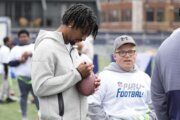Children who have difficulty sounding out words, struggle to learn letter names and sounds, or become easily frustrated by reading activities may be having more problems than most students when learning to read. Those can be signs of dyslexia, one of the most common learning differences in America.
Dyslexia is a neurologically based learning disability marked by difficulties with decoding and reading comprehension. An estimated 1 in 5 Americans have dyslexia, representing as many as 90% of all people with learning disabilities, according to the Yale Center for Dyslexia and Creativity.
Rebecca Mannis, a learning specialist and founder of Ivy Prep Learning Center in New York, says dyslexia can manifest at different times depending on the specific type of dyslexia, the student’s learning profile and their school and family life.
“Children who have significant difficulty with early language development and who have trouble telling apart sounds, called a phonological deficit, represent the most common subtype of dyslexia,” Mannis wrote in an email. Dyslexia may be identified early in these children, she says, because they have difficulty learning sound-symbol relationships.
“On the other hand, a bright, verbal child who has more difficulty with reading fluency or remembering sight words that can’t be decoded or sounded out, such as the words ‘thought’ or ‘would,’ may be able to compensate in early years,” Mannis says. Cases like that may go undetected until middle school or even high school or college.
[READ: What Does ‘Neurodivergent’ Mean?]
Education experts say there are many ways parents can help children with dyslexia, starting with recognizing common signs and taking action.
Recognizing and Diagnosing Dyslexia
People with dyslexia struggle to decode words, which is a crucial element of learning to read, Michelle Paster, an educational therapist and consultant in Massachusetts, wrote in an email. “Clinically speaking, the definition of dyslexia is a significant discrepancy between intelligence and performance in the area of reading,” she says.
Dyslexia impacts a child’s ability to recognize and spell words, read at a good pace and understand what has been read, says Liz Matheis, a certified school psychologist and consultant in New Jersey. “Some children read words backwards, from right to left, and some write letters and numbers backwards,” says Matheis, although she notes that it is developmentally appropriate for children in first grade and below to reverse letters and numbers.
“Children with dyslexia…struggle to consistently identify letters and sight words, and they confuse words that sound alike,” she says. “They also struggle to remember numbers and colors and with understanding rhyming sounds.” Often, there is a delay in speech development.
It is commonly believed that people with dyslexia see words differently, with letters flipped around. “While this can sometimes be true, dyslexia is really a catch-all diagnosis for people who struggle for a variety of reasons to sound out words,” Paster says. “Dyslexia can be caused by difficulties with either visual or auditory processing or a combination of both.”
Dyslexia Across Grade Levels
Dyslexia can be diagnosed by a speech pathologist, an educational psychologist or an educational diagnostician, says Jeannette Washington, an author and speech pathologist in Michigan.
The experts undertaking the evaluation will look at family history, oral and written language skills, reading, social skills and even motor skills. There are also specific cues by age and grade level. According to Understood, a nonprofit dedicated to providing parents with credible information about learning differences, common dyslexia signs at various stages include:
[READ: Podcasts for Kids.]
Preschool
— Difficulty pronouncing words
— Using general words to describe specific objects
— Trouble learning rhymes
— Difficulty with the alphabet and number sequences
— Retelling events out of order
— Difficulty with multi-step instructions
Kindergarten through 2nd grade
— Difficulty learning the names of letters
— Trouble remembering what sounds letters make
— Difficulty reading words without accompanying pictures
— Substituting similar words when reading
— Difficulty separating words into sounds and blending sounds into words
— Trouble with spelling
[READ: How Kids Can Get Dysgraphia Help in School.]
Grades 3-5
— Missing or confusing small words, such as “of,” when reading out loud
— Difficulty sounding out new words
— Trouble describing the events of a story or answering questions about it
— Difficulty recognizing sight words
— Repeated mistakes of the same kind, such as letter reversals
— Inconsistency with spelling
— Frustration and avoidance of reading
What Parents Can Do to Help
Usually, dyslexia is treated with a specific program that helps children build phonological abilities and improve reading skills. Programs like the Orton-Gillingham approach, Project Read and Wilson Reading System are commonly used.
“Although these treatments are helpful, they are very time intensive and do not work for all children,” says Amy Margolis, an assistant professor of medical psychology at Columbia University. Though experts say that almost every person who suffers from dyslexia can learn to read, Margolis says she sees a need for more research to develop new treatments for dyslexia.
Parents can help their children by seeking a full evaluation from a licensed educational psychologist or neurologist, according to Matheis. If a diagnosis of dyslexia is reached, parents of public school students can then advocate for the right support and services. Mannis says parents can often be the most potent advocates.
“By educating themselves and getting support, parents can then tee themselves up for the long haul and cheer their kids on as they reach smaller and larger milestones,” she says.
Some families may also opt for special schools that focus on students with dyslexia.
“Sometimes, kids need to move to a school that specializes in teaching children with dyslexia to read,” Margolis says. “These schools can turn a child’s life around, allowing them to experience success in school and develop good academic skills.”
Dyslexia Resources for Parents
For parents who want to know more about dyslexia, there are many resources available:
— Decoding Dyslexia is a parent-led advocacy group with branches in many states that can provide information.
— Understood is a nonprofit dedicated to providing parents with credible information about learning differences, including dyslexia.
— The International Dyslexia Association is a nonprofit dedicated to education and advocacy.
— The Reading League provides resources and support for teachers and parents.
Searching for a school? Explore our K-12 directory.
More from U.S. News
How English as a Second Language Affects Learning
What Is Dyslexia? originally appeared on usnews.com







